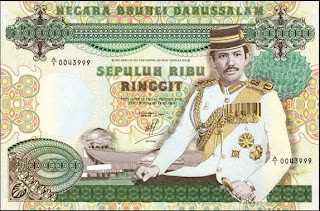A lot of people have the impression that a country needs to export something for the good of that particular country. Even some quarters of the mainstream economists, media and politicians agrees with the above statement. In fact every Tom, Dick and Harry agrees that a country needs to export something for its prosperity!
Well, I have a problem with the notion.....exporting for prosperity!
Let's me start by ask this question. What is the sole purpose of Brunei exporting her oil and gas overseas all these years? The last time I checked, it was a mean for our country earning hard currencies. The idea was that with these hard currencies, they are shall be used for developments, investments and savings of Brunei Darussalam. In fact the currencies that Brunei had been accumulating through the export of oil and gas are foreign currencies and it is not Brunei currency.
Since 1971, after the world abandon gold standard currency and adopt fiat currency, Brunei had been accepting and accumulation other's people fiat currencies - A currency that is being created without the backing of any tangible commodities such as gold but instead being backed up with faith of that issuing country.
So if our government had been accepting these foreign currencies as payment of Brunei's oil and gas exports, how come we only see or use Brunei Dollar in our everyday transaction? Where this Brunei dollars come from? Did it fell from the sky? Did Singapore create Brunei dollar?
It is ironic that those foreign currencies that our country had been accepting all these years can not be used in Brunei as everyday medium of transaction. Had any of you seen people paying for nasi katok with rupiah, yen and etc? Never, isn't it! Do you know why? Because those foreign currencies are not legal tender in Brunei Darussalam. The only legal tender in Brunei Darussalam is Brunei Dollar or Ringgit - B$. And the best of all, only His Majesty Government of Brunei Darussalam have the exclusive authority to create Brunei dollar.
So does it make sense for us to export oil and gas, then accumulate other's people fiat currencies and then knowing very well that those currencies can not be used in Brunei Darussalam?!...It's not, isn't it?!
From my perspective, going to work to produce real goods and services (such as oil and gas) to export for someone else to consume does us no economic good at all, unless we get to import and consume the real goods and services others produce in return. Put more succinctly: The real wealth of a nation is all it produces and keeps itself, plus all it imports, minus what it must export.
Imports are real benefits. Exports are real costs.
So how can we develop our country? Since our government have the exclusive authority to create Brunei dollar, my suggestion would be for our government to create more Brunei dollar and start initiating of buying real goods and services. That's how. Our country needs more housing, universities, hospitals, police, fire, teachers, forest rangers, develop PMB, grow more rice, rear more cattle, goats, fish and etc. Brunei do not needs to export her resources for her development, she needs to import other people resources for her development. Brunei needs MRT, needs electric cars, solar panels, wind trubines and etc. All these can be done if the country is willing to create more Brunei dollar and start importing or making those stuffs!
The fact is government spending is better in simulating development in Brunei than exporting because government spending does not require us to send valuable goods such as oil and gas overseas. We can keep them right here, enriching Brunei Darussalam.
So in summary, more government spending is identical to exporting. Both activities add more money to Brunei's economy. However, government spending has the advantage of not requiring us to send our valuable goods and services overseas.
What is more interesting, with every country in this world all have the same mentality of exporting to prosperity, I suggest that our country, Brunei Darussalam SHOULD take full advantage of this. Importing all the required goods and services in order to achieve her 2035 vision. In fact that vision can be achieved in 5 to 10 years time and not by 2035!


























